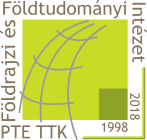Tájkép
Credit: Forrás: Mánfai György

Doctoral School of Earth Sciences
Contact
Documents
Forms
For prospective students
FAQ
The PhD programme "Spatial-Environmental Problems of Socio-Economic Activity", which started in 1994, developed into the PTE Doctoral School of Earth Sciences, which has been accredited as a doctoral programme since 2001. Over the last almost three decades, more than 200 people have obtained PhD degrees in almost all fields of earth sciences.
The Doctoral School of Earth Sciences has three accredited programmes:
- Political Geography, Geopolitics and Geo-economics from a Central European Perspective - Norbert Pap
- Social Geography - András Trócsányi
- Physical Geography, Geology and Meteorology - János Kovács
Students' choice of topics, training themes and theoretical and applied research are linked to these programmes and within thematic groups. Students are assisted by subject leaders with academic degrees and substantial research experience. In addition to our lecturers, guest lectures are regularly given by renowned national and international experts.
Students enrolling in the geopolitics programme can carry out research on the political geography of the Central European and Balkan region, geopolitical processes related to the region, or the impact of geography on economic processes, among other topics.
Students applying for the Social Geography programme may also explore the frontiers of social geography, in addition to classical regional geography, population and settlement geography and tourism.
Students on the Natural Geography programme can develop geographic information systems (GIS) applications, study short- and long-term changes in land use, and research geological, geomorphological, meteorological and hydrogeographical topics.
Once admitted, doctoral students will become 'staff' of the Institute, participating in the life of the Institute and its departments, and getting involved in its scientific research. They can participate (optionally) in teaching at BSc and MSc level, which can help them to develop their lecturing skills.
Doctoral students can choose between two types of funding: public scholarships or self-financing. The Hungarian-language scholarship programme is open to 8-12 students per year, with a limited number of English-language courses also available for foreign nationals. With the support of Tempus, Ceepus, Erasmus and other state scholarships, our students have participated in several internships abroad in several European countries and have also travelled to distant parts of the world on study trips. Both public scholarship students and self-financed students can apply for funding under the KDP (Cooperative Doctoral Programme) and the scholarship programme supported by the NRCP.

.jpg)